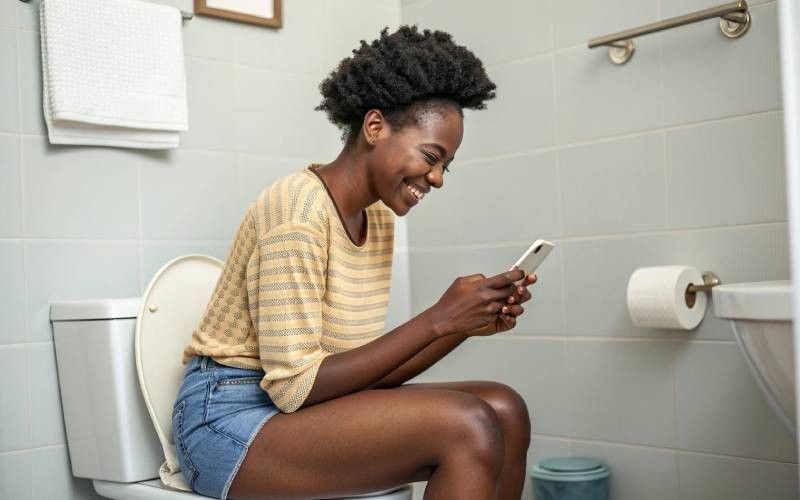
Let’s be honest, we’re all guilty of this bad habit.
You take your phone to the toilet, thinking you’ll only be there for a few minutes, but fifteen minutes later, you’re still scrolling through Instagram or TikTok, long after you’ve done your business. You catch up on messages, escape from work stress, or enjoy a little “me time.” It feels harmless, right?
Wrong.
Aside from the fact that sitting in the toilet too long can cause more harm to your body than you realise, it’s a disgusting habit.
Why Sitting On The Toilet Feels So Good
Honestly, for most people, the bathroom is one of the few places where you get privacy and silence. No phone calls, no children calling your name, and no bosses asking for updates. Just you, your phone, and peace. That’s why it’s easy to turn those few minutes into a mini-break.
But! The toilet is not a chair. It’s designed for short use, and your sitting posture is not as harmless as it feels.
What Happens To Your Body When You Sit Too Long?
When you sit on the toilet for an extended time, your body weight rests directly on the veins in your rectum and anus. That constant pressure can cause swelling and irritation. Over time, this increases the risk of those painful, sometimes bleeding lumps (haemorrhoids) that many adults experience at least once in their lifetime.
Nurse Esther Ijeoma Francis, a fertility coach and women’s health educator, says, “The longer you stay seated, the more gravity pulls blood into those veins. It doesn’t seem like much at first, but that pressure builds up, and that’s how piles begin to form.”
If you’re someone who already struggles with constipation or has a sedentary lifestyle, that’s a double hit. The longer you sit, the longer your veins are under strain, and that increases discomfort, pain, and even the possibility of developing chronic haemorrhoids.
Nurse Esther adds, “People don’t realise that something as simple as scrolling on your phone can contribute to piles. Once you’re done, stand up and move. Staying longer than necessary is what does the damage.”
Your Posture Also Matters
Most toilets put your body in a 90-degree sitting position, but your body was actually designed to poop in a more squatted position. That’s why some people find that using a small footstool or squatty potty helps things move along more easily.
When you sit in the usual way with your legs bent at a right angle, your rectum isn’t completely straight. This makes bowel movements a little harder, sometimes forcing you to push. Add scrolling to that, and you’re now distracted, which means you sit even longer than necessary.
Nurse Esther explains, “That position where your knees are at a right angle isn’t ideal. It traps pressure and slows things down. If you adjust your sitting posture slightly, you’ll notice it’s easier to go and finish faster.”
The Impact On Your Legs And Back
There’s another physical side effect you probably haven’t noticed. Sitting on the toilet for too long can cause numbness or tingling in your legs. That’s because of temporary nerve compression and restricted blood flow from the hard seat.
If your phone session lasts long enough for your legs to “fall asleep,” that’s a red flag/ Over time, this can also worsen lower back pain, especially for people who sit at a desk all day.
How Long Is Too Long?
Doctors say you shouldn’t spend more than ten minutes on the toilet once you sit down. If you find yourself staying longer, it’s a sign that something’s off. Either your diet, your hydration, or your phone habit.
Try timing yourself once in a while. You’ll be surprised how fast those ten-minute toilet breaks add up.
How To Break The Habit
You don’t need to quit immediately, but you can retrain yourself to use the toilet mindfully. Here are a few simple tips that actually work:
-
Leave your phone outside the bathroom. If you can’t resist checking it, put it on DND (Do Not Disturb) before you go in.
-
Focus on finishing your business, not scrolling. Tell yourself you can check your phone right after.
-
Check your diet. If pooping regularly takes too long, increase your fibre intake (fruits, veggies, oats) and drink more water.
-
Take short walks and stretch often, as that can help your digestion and prevent constipation.
As Nurse Esther sums it up, “Use the toilet solely for what it’s meant for. Once you’re done, get up, clean up, and move on. That’s how you protect yourself from avoidable health issues.”
It might feel weird to ditch your phone at first, like you’re losing your quiet break, but you’ll be doing your body a favour. So next time you catch yourself watching IG reels mid-poop, snap out of it and focus! The toilet should be a no-scrolling zone.








